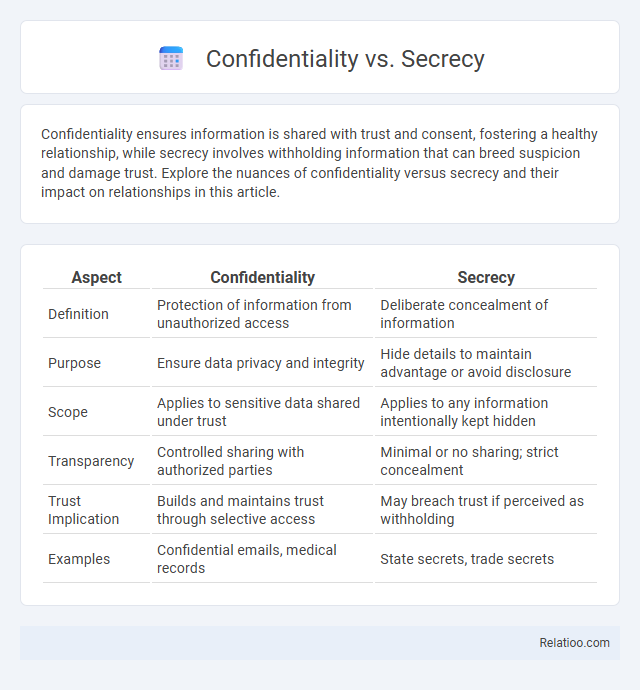Confidentiality ensures information is shared with trust and consent, fostering a healthy relationship, while secrecy involves withholding information that can breed suspicion and damage trust. Explore the nuances of confidentiality versus secrecy and their impact on relationships in this article.
Table of Comparison
| Aspect | Confidentiality | Secrecy |
|---|---|---|
| Definition | Protection of information from unauthorized access | Deliberate concealment of information |
| Purpose | Ensure data privacy and integrity | Hide details to maintain advantage or avoid disclosure |
| Scope | Applies to sensitive data shared under trust | Applies to any information intentionally kept hidden |
| Transparency | Controlled sharing with authorized parties | Minimal or no sharing; strict concealment |
| Trust Implication | Builds and maintains trust through selective access | May breach trust if perceived as withholding |
| Examples | Confidential emails, medical records | State secrets, trade secrets |
Understanding Confidentiality: Definition and Scope
Confidentiality involves the ethical and legal obligation to protect sensitive information from unauthorized access, ensuring data privacy within defined boundaries such as personal data or trade secrets. Unlike secrecy, which implies intentionally hiding information often without a legal framework, confidentiality establishes trust by controlling access based on roles and permissions. Understanding confidentiality requires recognizing its scope in both organizational policies and regulatory compliance, emphasizing information sharing only to authorized parties under agreed-upon conditions.
What is Secrecy? Key Characteristics
Secrecy involves deliberately hiding information from others to prevent unauthorized access or disclosure, often used in sensitive situations like military operations or corporate strategies. Key characteristics of secrecy include restricted access, controlled dissemination, and intentional concealment to protect privacy or maintain competitive advantage. Your ability to maintain secrecy depends on establishing strict protocols and monitoring who can access specific information.
Confidentiality vs Secrecy: Core Differences
Confidentiality ensures that information is shared only with authorized individuals to protect privacy and trust, while secrecy implies intentionally hiding information to prevent disclosure regardless of the audience. Confidentiality is often governed by policies, legal frameworks, or ethical standards in fields like healthcare and cybersecurity, emphasizing controlled access rather than absolute concealment. Secrecy, by contrast, can involve covert or deceptive tactics aimed at complete concealment, often without formal boundaries or accountability.
Legal Implications: Confidentiality and Secrecy in Law
Confidentiality in law refers to the ethical and legal obligation to protect sensitive information from unauthorized disclosure, often codified in contracts or professional standards such as attorney-client privilege or doctor-patient confidentiality. Secrecy, while also involving restricted access to information, generally lacks the same legal protections and may relate to trade secrets or classified government data, with violations potentially resulting in criminal or civil penalties. Understanding the distinction impacts your legal responsibilities and rights, as breaches of confidentiality can lead to lawsuits, while breaches of secrecy might involve regulatory sanctions or national security consequences.
Confidentiality in Professional Settings
Confidentiality in professional settings ensures that sensitive information is protected and only disclosed to authorized individuals, maintaining trust and compliance with legal standards. Unlike secrecy, which implies keeping information hidden regardless of context, confidentiality balances transparency with privacy to safeguard client or company data. Your commitment to confidentiality fosters a secure environment where information integrity and ethical responsibilities are upheld.
The Role of Secrecy in Personal and Organizational Contexts
Secrecy plays a critical role in both personal and organizational contexts by controlling access to sensitive information to protect privacy and maintain competitive advantage. Unlike confidentiality, which often involves formal agreements to restrict information sharing, secrecy implies deliberate concealment to prevent unauthorized knowledge or exposure. In organizations, secrecy safeguards proprietary data and strategic plans, while on a personal level, it preserves individual privacy and social boundaries.
Ethical Considerations: When to Protect or Share Information
Confidentiality requires safeguarding sensitive information entrusted to you, ensuring it is shared only with authorized parties to maintain trust and comply with ethical standards. Secrecy involves deliberately hiding information, often creating ethical dilemmas when withholding knowledge could harm others or prevent transparency. Your ethical responsibility is to balance protecting private data while recognizing situations where sharing information serves the greater good or legal obligations.
Risks and Consequences of Breaching Confidentiality
Breaching confidentiality exposes sensitive information, leading to legal penalties, loss of trust, and significant reputational damage for individuals and organizations. Unlike secrecy, confidentiality is a formal obligation to protect private data, and violating this duty can result in financial losses, regulatory fines, and compromised personal or business security. Your failure to maintain confidentiality risks not only legal consequences but also undermines client relationships and organizational integrity.
Managing Secrets: Impact on Trust and Relationships
Confidentiality involves protecting sensitive information shared within a trusted relationship to maintain privacy and trust, while secrecy denotes the deliberate withholding of information to prevent disclosure. Managing secrets effectively requires balancing transparency and discretion, as mishandling can erode trust and damage your personal or professional relationships. Understanding these distinctions strengthens communication and fosters a secure environment for sharing important information.
Best Practices for Maintaining Confidentiality and Avoiding Unnecessary Secrecy
Best practices for maintaining confidentiality include implementing strict access controls, encrypting sensitive data, and regularly training employees on data privacy policies. Avoiding unnecessary secrecy involves fostering transparent communication, sharing information on a need-to-know basis, and documenting decision-making processes to build trust and accountability. Balancing confidentiality and openness ensures sensitive information is protected while preventing the negative effects of excessive secrecy on organizational culture.

Infographic: Confidentiality vs Secrecy
 relatioo.com
relatioo.com